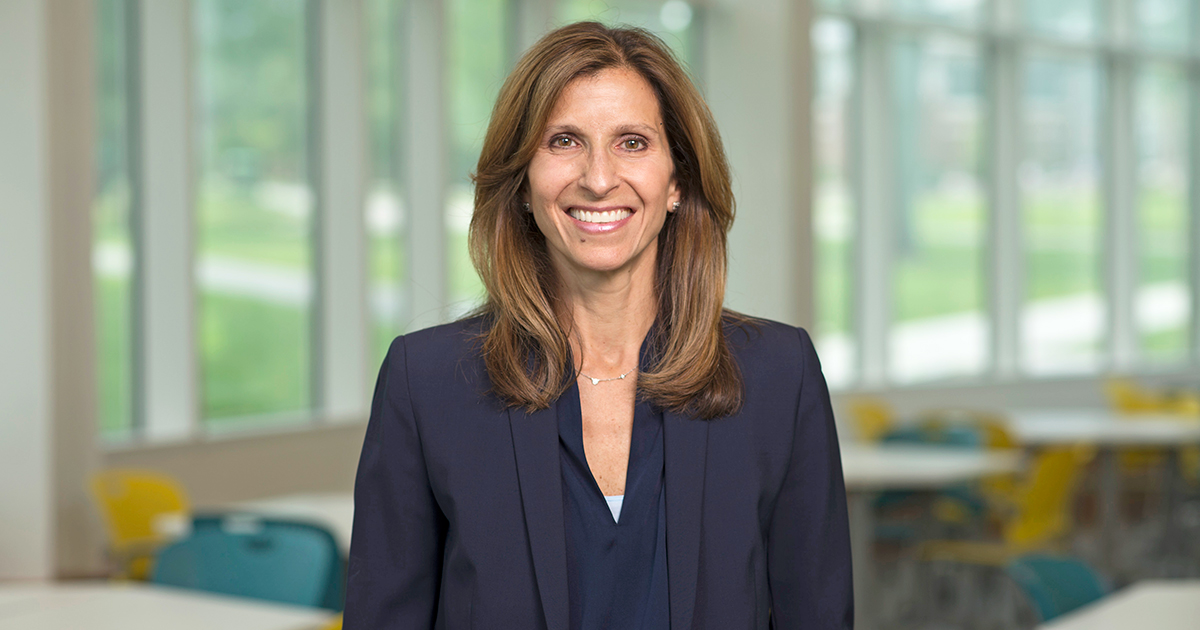Chair of the Board of Trustees, Marla Capozzi, Urges Students to Never Stop Learning

Marla Capozzi MBA’96 made history in 2017 by becoming the first female chair of Babson’s Board of Trustees. She has worked for McKinsey & Company for the past 18 years leading global innovation and strategy and, currently, McKinsey Academy, a new venture to build capabilities for clients.
Capozzi has had a long relationship with Babson College. She graduated from the Babson MBA program in 1996 with honors. In 2006, Capozzi received a Distinguished Recent Alumni Award and, in 2017, received the Richard J. Snyder Distinguished Service to the College Award, which goes to a graduate who has done outstanding service to the College. Capozzi also served on Babson College’s Center for Women’s Entrepreneurial Leadership advisory board.
I recently had the opportunity to sit down with Capozzi and interview her for an assignment in my Business Writing class. Fundamentally, academia and business are very different industries, so I wanted to talk to Capozzi about her dual experiences and how she has been able to grow her professional competencies as a result of both of her roles.
If there was one thing to learn from Marla Capozzi, it is to never stop learning.
What are the important tools you have acquired through consulting, and how have you been able to apply them to your role at Babson?
Working at McKinsey has allowed me to build my problem-solving skills and analytical thinking. It’s funny; I think in some ways I have taken for granted the skills I have acquired at McKinsey. I found myself assuming everyone has had the same opportunity to learn problem solving, and these other skills that I have, but they haven’t. It is a privilege that I have had, and I am now able to pass these skills and tools on to my colleagues at Babson, who were never exposed prior.
Just as in any job, there are always issues that arise that need immediate attention. Being able to apply these problem-solving skills to issues at Babson, I have found, has been very valuable. Learning how to critically analyze a situation, think about the implications of the actions we might take, and quickly come up with the best solution has been a really valuable skill set that has transferred from McKinsey to my role at Babson. At Babson, I have learned to apply ET&A™ [Entrepreneurial Thought & Action®] and have found it to be very reinforcing to my professional career, and my problem solving in general. While analytical thinking and problem solving is critical, with ET&A, I have learned to get going quickly and not over analyze—this combination has allowed me to be entrepreneurial in all I do.
I find myself connecting the dots across problems I see at work to problems that come up at Babson constantly. It really doesn’t matter who you are working with; the issues that arise can be very similar.
How has being the chair of Babson’s Board of Trustees changed your approach in consulting or how you view problems in general?
I find myself taking more time to think about problems since my role at Babson. At McKinsey, if we have a problem, the immediate instinct is to sit down and problem-solve it, and we all have a shared language and process. Now, given my experiences at Babson, I think more about the type of problem to be solved and what is the best approach to that challenge. By merging these two ideas, I have found I am now somewhere in the middle when brainstorming: I will often analyze an issue and all of the implications more than I did before working at Babson, but still keeping this time sensitivity in mind and apply[ing] my problem-solving experience from McKinsey.
How are your colleagues at Babson different from your colleagues at McKinsey?
I have the privilege of working with some of the smartest people in the world, both at McKinsey and at Babson. Many people in their careers do not get to connect the world of academics to the world of business. I feel as though I am so lucky to have such a smart group of people to learn from and work with every day.
Given your important roles, what strategies do you have for managing time?
I don’t really believe in balance. I know that might sound strange but for me, life and work merge together. I do believe in the saying that you can have it all, just not at the same time as the saying goes. In order to have it all, you have to work hard at it and be intentional. For example, if I were to look at my day-to-day life, I would feel like I was doing nothing well; but when I look across a week or a month, I am able to reallocate time across all my priorities.
What advice do you have for Babson students?
If I could give you one recommendation, it would be to never close yourself off from learning more about your field and other areas of expertise. Each individual is proficient in something different. So often I see people take for granted their own abilities. As individuals, we are never done learning and growing. Babson taught me to always challenge the status quo, to take action quickly, and to be an entrepreneur in all I do. If I was to only work at McKinsey, I would still be able to learn so much, but there would still be this gap in my knowledge. My Babson colleagues, faculty, and fellow governance members have taught me things I would not have learned at McKinsey. By working with talented people, I have found myself constantly learning new perspectives, skills, and tools that I apply to my work, to my leadership skills, and everyday life.
Posted in Community, Entrepreneurial Leadership





